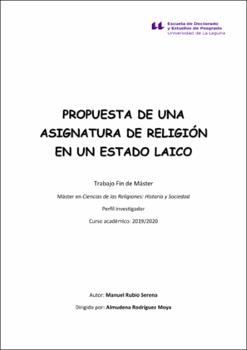Propuesta de una asignatura de Religión en un estado laico
Autor
Rubio Serena, ManuelFecha
2021Resumen
Hoy día, las aulas se caracterizan por la heterogeneidad y la diversidad de su
alumnado, tanto a nivel social como económico o ideológico, en el sentido más amplio
de los conceptos. En lo referido a las creencias/ideologías religiosas de los escolares, se
hace preciso indagar sobre ello y ver hasta qué punto se trata de un postulado
significativo en el currículo y cuál es el seguimiento y la participación que, en este caso
concreto, hace el alumnado de la asignatura de Religión.
El presente trabajo de investigación tiene como objetivo general describir y
analizar las actitudes, conocimientos e implicación de los escolares respecto a la
asignatura de Religión, así como aquellos factores que pueden favorecer u obstaculizar
el desarrollo efectivo de la misma. Para ello, se ha llevado a cabo un estudio de caso en
seis centros públicos de Educación Primaria, tanto de Córdoba capital como de su
provincia, de tipo exploratorio-descriptivo, a través de una metodología cuantitativa. Se
ha utilizado, como instrumento de recogida, el cuestionario. Dicho instrumento ha
tenido que hacerse de manera digital, por los condicionantes que ha acarreado el
coronavirus y facilitarse a los encuestados a través de correos electrónicos. Su recogida
ha sido vía online.
Los resultados han evidenciado que el alumnado, en su inmensa mayoría, ha
elegido cursar la asignatura de Religión (sobre todo, la católica). También se ha
constatado que un número significativo, pero no equiparable al anterior, han optado por
no recibir enseñanzas y decantarse por la asignatura alternativa, en este caso, Valores
Sociales y Cívicos. En cuanto al conocimiento, por parte del alumnado, del aspecto
normativo de dicha asignatura, decir que es insignificante, dado que un notable número
de personas encuestadas, dice no saber nada acerca de ello. De cualquier manera, puede
afirmarse que el peso específico de la asignatura de Religión en el currículo, al igual que
su implicación social, sigue siendo notable y de cierta influencia en el proceso
enseñanza-aprendizaje, aunque no tanto como el de las asignaturas troncales. Nowadays, classrooms are characterized by the heterogeneity and diversity of
their students, both at a social, economic or ideological level, in the broadest sense of the concepts. Regarding the religious beliefs/ideologies of schoolchildren, it is
necessary to inquire about it and see to what extent it is a significant postulate in the curriculum and what is the follow-up and participation that, in this specific case, the students of the Religion subject. The general objective of this research work is to describe and analyze the attitudes, knowledge and involvement of schoolchildren regarding the subject of Religion, as well as those factors that can favor or hinder its effective development. For this, a case study has been carried out in six public Primary Education establishments, both in the capital Córdoba and its province, of an exploratory-descriptive type, through a quantitative methodology. The questionnaire was used as a collection instrument. This instrument has had to be done digitally, due to the conditions that the coronavirus has brought with it, and provided to those surveyed through emails. Its collection has been via online.
The results have shown that the vast majority of students have chosen to take the
subject of Religion (especially Catholic). It has also been found that a significant
number, but not comparable to the previous one, have chosen not to receive education and opt for the alternative subject, in this case, Social and Civic Values. Concerning the knowledge, of the students, of the normative aspect subject, it is insignificant, given that a notable number of people surveyed say they do not know anything about it. In any case, it can be affirmed that the specific weight of the Religion subject in the curriculum, as well as its social implication, continues to be notable and has a certain influence on the teaching-learning process, although not as much as that of the core subjects.





